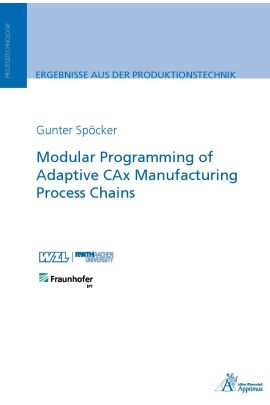Dieses E-Book können Sie hier herunterladen.
The manufacturing industry is undergoing major changes as the focus is shifting from single manufacturing processes towards manufacturing process chains. In order to achieve the desired result, it is not only important to optimize each manufacturing technology separately but also the combination of manufacturing processes. Reasons for this new perspective include mass-customization, cyber-physical systems, the request for resource efficiency and the rise of novel near-net-shape production technologies. These trends require flexible manufacturing process chains, which have the capability to dynamically adapt to varying inputs. This is one of the key objectives of the high-tech strategy, Industrie 4.0.
Today’s CAx systems and approaches are not suitable to program adaptive CAx process chains, especially when they include additive manufacturing technologies. In addition, modeling and planning of manufacturing process chains is still mostly done manually as it requires detailed process knowledge and experienced personnel.
To overcome the current situation, this thesis proposes a new approach that can capture the required manufacturing process knowledge and is able to support automated execution of the process chains. Due to the diversity of the manufacturing domain in terms of processes, technologies, machine tools and applications, the proposed approach is designed to integrate with the existing CAx software. Hence, it is industrially applicable today.
The well-known design method of function blocks is used as a basis for programming of adaptive CAx process chains with respect to the existing CAx environment. However, function blocks are extended in two ways. First, the concept of data format manifests is established. This allows a process-centric way of data handling, relying on the best-suited data format for each communication. The approach thereby reduces data loss and preserves high data quality. Secondly, placeholder function blocks are introduced which provide an additional abstraction layer. This way, adaptive CAx process chains can be programmed generically and reuse of former models is encouraged.
The proposed approach is verified based on the use case of a BLIR segment. In order to dynamically choose, adapt and execute the CAx process chains, repair features are used. They allow generating high-quality CAM programs based on the nominal CAD model and measurement input. This combination constitutes a level of adaptivity that has not been achieved previously.
| Autor | Spöcker, Gunter |
|---|---|
| Lieferzeit | 3-4 Tage |
| Gewicht | 0.27 kg |
| Erscheinungsdatum | 07.11.2016 |
Prozesstechnologie
Modular Programming of Adaptive CAx Manufacturing Process Chains (E-Book)
Kurzbeschreibung
Dieses E-Book können Sie hier herunterladen.
The manufacturing industry is undergoing major changes due to current trends like mass-customization and Industrie 4.0. However, today’s CAx systems and approaches are not suitable to handle adaptive CAx process chains. To overcome this situation and to close the gaps between the existing CAx environment and the requirements for the manufacturing of the future, a modular approach based on extended function blocks is presented. The proposed approach is verified based on the use case of a worn-out BLIR segment by using repair features.

